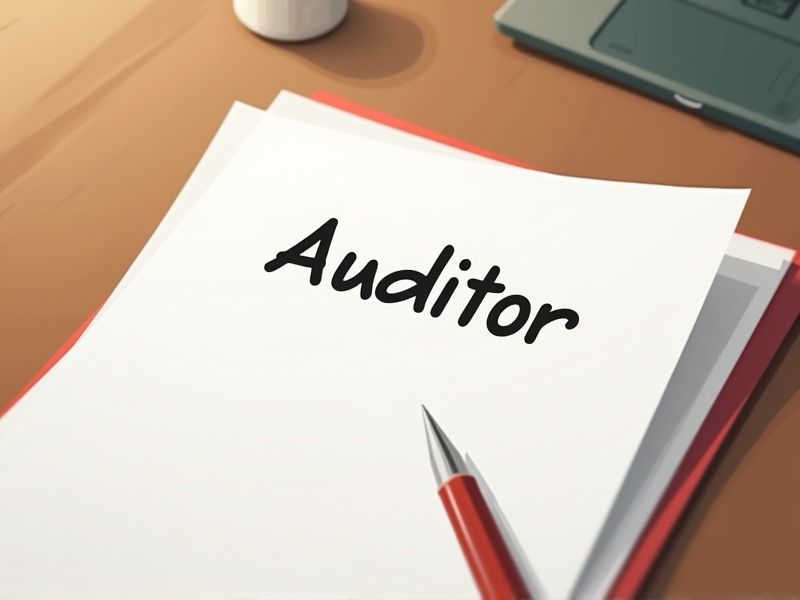
Auditors require specific certifications to substantiate their expertise and credibility in evaluating financial records. Certifications provide them with the necessary knowledge to adhere to regulatory standards and frameworks. They also play a role in enhancing an auditor's ability to identify financial discrepancies and implement corrective measures. Some important certifications we recommend for auditors are listed below.
Certified Internal Auditor (CIA)
The Certified Internal Auditor (CIA) designation enhances an auditor's professional credibility, often leading to greater trust from stakeholders. Achieving a CIA certification reflects a comprehensive understanding of internal audit standards and techniques. Companies prefer hiring auditors with a CIA credential due to their proven ability to improve organizational governance and internal controls. Being a CIA can significantly increase an auditor's career prospects and earning potential by demonstrating expertise and commitment to the field.
Certified Information Systems Auditor (CISA)
Organizations face increasing cybersecurity threats, prompting the need for CISA-certified auditors to ensure robust information systems controls and practices. The CISA credential provides auditors with specialized knowledge to evaluate the design and effectiveness of IT governance structures. Hiring CISA-certified auditors reassures stakeholders that their information assets are protected and risk management strategies are in place. Those with CISA certification are recognized globally for their expertise, enhancing their ability to work across various industries.
Certified Fraud Examiner (CFE)
A Certified Fraud Examiner provides specialized expertise in detecting and preventing fraud, enhancing the auditor's ability to identify irregularities in financial statements. Their training equips them with unique skills in understanding fraud schemes, which complements the auditor's analysis of financial data. CFEs also bring a deep knowledge of legal aspects related to fraud, helping auditors address compliance concerns effectively. With the increasing sophistication of fraudulent activities, auditors benefit from CFEs' insights to protect organizations against financial crime.
Certified Public Accountant (CPA)
Certified Public Accountants (CPAs) bring a detailed understanding of financial regulations, critical for accurate auditing. Their rigorous training and certification process ensures they possess the necessary skills to identify financial discrepancies and assess risks. CPAs uphold strict ethical standards, promoting trust and credibility in financial reports. They are also well-versed in tax laws and financial reporting standards, crucial for compliance and strategic financial planning.
Certified Government Auditing Professional (CGAP)
The CGAP credential enhances an auditor's credibility by demonstrating expertise in government auditing standards and principles. It equips professionals with specialized knowledge tailored to the public sector, improving audit quality and compliance. By obtaining CGAP, auditors can access broader career opportunities within government agencies due to their validated skill set. Additionally, it increases trust among stakeholders by ensuring audits are conducted with the highest level of competence and ethical standards.
Certified Risk Management Assurance (CRMA)
Certified Risk Management Assurance (CRMA) equips auditors with specialized skills to evaluate risk management processes effectively. This certification enhances an auditor's ability to provide assurance over risk frameworks, increasing their value within an organization. Demand for CRMA-certified auditors is rising because organizations face complex risks requiring a deeper understanding of risk assessment and management. Holding a CRMA demonstrates a commitment to continuous professional development, often leading to career advancement opportunities.
Certified Financial Services Auditor (CFSA)
A Certified Financial Services Auditor (CFSA) enhances an auditor's expertise in evaluating financial risk and compliance in the financial services industry. The credential validates an auditor's proficiency in handling complex financial regulations and assessing internal controls effectively. Financial institutions often prefer hiring CFSAs to ensure industry-specific auditing standards and practices are adhered to. This certification equips auditors with advanced skills, leading to improved audit quality and increased trust from stakeholders.
Certified in Risk and Information Systems Control (CRISC)
The CRISC certification is essential for auditors because it equips them with the skills to effectively identify and manage IT risks, which are integral to safeguarding an organization's information systems. As auditors delve into the systems, they require a deep understanding of risk frameworks provided by CRISC to accurately assess potential vulnerabilities. The certification also enhances their ability to communicate risks and mitigation strategies to stakeholders, promoting informed decision-making. With this qualification, auditors gain recognition and credibility, bolstering their professional standing and career growth in the risk management domain.
Certified Information Security Manager (CISM)
Certified Information Security Manager (CISM) certification equips an auditor with specialized knowledge in information security management. This expertise enables auditors to effectively evaluate an organization's security posture and risk management processes. The CISM certification provides a comprehensive understanding of governance frameworks, enhancing an auditor's ability to ensure regulatory compliance. It also facilitates improved communication with IT professionals, contributing to more robust security assessments.
Certified Quality Auditor (CQA)
Being a Certified Quality Auditor (CQA) equips auditors with specialized knowledge and skills necessary for evaluating the quality processes of an organization effectively. The certification ensures auditors are proficient in planning, conducting, and reporting an audit in line with international standards. CQA credentials enhance an auditor's ability to identify inefficiencies and recommend improvements, thereby reinforcing an organization's capability to maintain compliance and quality. Organizations benefiting from CQAs tend to experience increased customer satisfaction due to consistent delivery of high-quality products and services.
Summary
By obtaining certifications, you enhance your skills and credibility as an auditor. This new qualification increases your demand in competitive job markets. Employers tend to trust certified auditors more, which can lead to career advancement opportunities. Certified auditors often experience higher job satisfaction and may command higher salaries.
